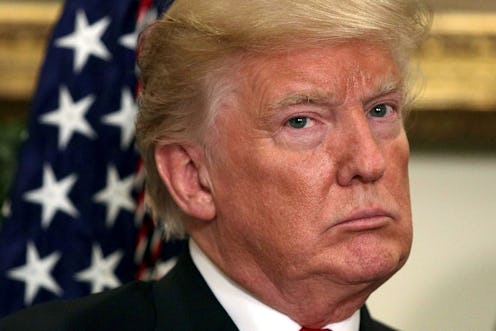News
Trump Has Reportedly Been Asking Aides If He Can Pardon Himself

The investigation into the Trump campaign's ties to Russia and possible obstruction of justice for that investigation by the president himself has only gotten more serious since former FBI Director Robert Mueller was appointed as a special counsel in May. According to a Washington Post report Friday, the president's lawyers have been seeking avenues to hinder or discredit Mueller's investigation, and as part of his "curiosity" in understanding the extent of his pardoning powers, President Trump asked advisers if he can pardon himself.
No president has ever actually attempted to pardon himself. The two most recent presidents for whom that might have been an issue stopped short of going that far — President Bill Clinton promised in 1998 he would not pardon himself, and President Richard Nixon resigned before he himself was in any legal jeopardy, though he was later pardoned by his successor, President Gerald Ford.
"This is uncharted waters," Margaret Love, who served as pardon attorney in the Department of Justice from 1990 to 1997, under presidents Bush and Clinton, tells Bustle. "I don't know of any case in the state systems where a governor has ever tried to pardon himself. The fact that nobody's tried it, even though a number have been under indictment or prosecuted or convicted, I think is pretty telling."
The full, untested power of the presidential pardon is uncertain. Pardoning authority is vested in the president through brief and somewhat vague language in the Constitution — "he shall have Power to grant Reprieves and Pardons for Offences [sic] against the United States, except in Cases of Impeachment." Every president (except James Garfield and William Henry Harrison, who each served less than a year and didn't have a chance) has taken advantage of this power. It is generally assumed to apply to whomever the president sees fit to pardon.
Back in 1974, the Justice Department's Office of Legal Counsel wrote a memorandum stating the opinion that the president does not have the power to pardon himself. "Under the fundamental rule that no one may be a judge in his own case, the President cannot pardon himself," wrote Mary Lawton, then the Acting Attorney General. But OLC memos can be updated (though the office tries not to outright supersede itself), and this president has rarely followed legal advice.
"The Constitution gives the president a lot of flexibility in how he uses the clemency power, and he is not bound by what executive branch officials (the OLC, the Pardon Attorney’s Office, etc.) might say," Jeffrey Crouch, assistant professor of American Politics at American University and author of The Presidential Pardon Power, tells Bustle in an email. With the president already expressing his distrust for his own attorney general and other Justice Department officials, it is possible he would ignore their advice.
Love worries about the kind of abuse of power that might happen if the power of the pardon is removed from oversight by DOJ. "The president has counted on the Justice Department to make recommendations to him on pardon matters ever since the Civil War," says Love. "The attorney general has been the bulwark. This started with Edmund Bates, who was Lincoln's attorney general. The president couldn't be trusted with the power — this is Lincoln — so everything would go through him from now on. If the Justice Department is no longer available to the president, because for example, the president doesn't trust the Justice Department, he's kind of on his own, and that would be I think very unfortunate."
The president's ability to pardon himself may become moot anyway, since under DOJ policy, a sitting president cannot be indicted for a crime. This would mean that any self-pardon would only matter after the president leaves office. Cornell Law Professor Michael Dorf tells Bustle: "The way it would work presumably is: president pardons himself, he either serves out his term or terms, is impeached, or leaves office in some other way, he's then indicted by the new administration or an independent counsel, he then pleads his pardon in defense. I guess that's the way it would be tested."
While the legal standing of a presidential pardon upon himself is still unclear, all legal experts reached by Bustle agree that the president's ability to pardon others, such as his own aides or family members, is essentially unlimited (though the president cannot pardon crimes at the state level, or crimes not yet committed). The framers of the Constitution did not block this power, feeling instead that political considerations would prevent a president from abusing this power.
James Iredell, one of the first U.S. Supreme Court Justices, wrote that a president would be held back from abusing the pardon by a risk of "the damnation of his fame to all future ages." If the president starts using the power of the pardon to beat back investigations into his administration, it's up to him if he wants to run that risk.